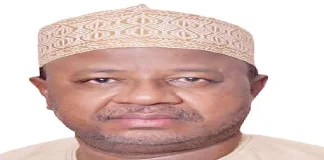🌿 Ruzu Non-Alcoholic Herbal Bitters
Ruzu Non-Alcoholic Herbal Bitters is a natural health supplement specially formulated to:
- ✅ Promote general wellness
- ✅ Detoxify the body
- ✅ Support the treatment of various ailments
Made from a powerful blend of 100% organic and medicinal herbs, Ruzu is completely alcohol-free, making it ideal for:
- 👪 All age groups
- 🌱 Health-conscious individuals
- 🌿 Anyone seeking non-alcoholic herbal remedies
Whether you're looking to boost your vitality, cleanse your system, or support healing the natural way, Ruzu Bitters offers a trusted herbal solution.
Religious leaders have taken issue with Niger State Governor Umar Bago’s announcement that clerics must submit sermons for assessment and get licenses within two months.
During a TVC interview, the governor reportedly said, “Everyone going to sermon on Friday should bring his scriptures for review.”
Across the state, the statement has sparked discussions. While some have hailed it as a daring move toward peace, others are concerned that it would violate religious freedom.
But Umar Farooq, the Director-General of Niger State Religious Affairs, defended the governor by stating that the new policy is actually the resuscitation of an edict from 1985 rather than a new one.
“In Niger State, there is a law. This policy is not new; the decree law has existed since 1985. We’re working to bring the law back to life and make it work so that we may live in harmony and prevent conflict,” he stated.
He went on to say that while preaching is not prohibited by law, priests should exercise caution when speaking.
“A person’s cleric status does not grant them the freedom to say whatever they choose. Preaching in Niger State has not been outlawed. The governor does not outlaw preaching, but preachers must refrain from instigating violence, propagating hatred, or disparaging other individuals or organizations, Farooq stated, emphasizing that the objective is to maintain harmony and sanitize the preaching area rather than to silence anyone.
According to the DG, the government will also:
Create a database and register clerics by distributing forms to religious organizations.
After preachers are trained and their capacity is increased, certificates will be given out.
Ascertain that organizations and sects serve as guarantors for their preachers.
Since their sect is familiar with them and will provide guarantors, Farooq stated, “We target their groups when a preacher violates these things.”
“Guide Only For Muslim Clergy” – CAN
As for the directive, the Christian Association of Nigeria (CAN), Niger State branch, has explained that it currently only applies to Islamic clerics who are registered with Da’awa.
“When the news first broke, many thought it covered everyone, pastors, reverends, and imams,” Daniel Atori, the aide to the State CAN Chairman, said in a statement provided to reporters in Minna. Reviewing the instruction, however, revealed that it was primarily intended for Islamic clerics who were registered with Da’awa.
He connected the action to grievances regarding inflammatory sermons given by certain preachers, especially in regions where they were said to have threatened democracy and sparked unrest.
It was established at the Christian Association that Christians were not covered by the order. “The available form is exclusively for the Islamic community,” Atori stated.
Criticizes Political Manipulation and Extremism
The emergence of extreme speakers and sect rivalries, according to Jabeer Mukthar Salisu, an Islamic cleric based in Kano, may have been the driving force behind the decision.
According to their followers, clerics are taken seriously for anything they say. He maintained that the government should refuse to license a priest who has a history of inciting violence.
But he cautioned that people worry about the law being misused. “Many people are concerned about whether the government would use this law to quiet those it doesn’t like. “People will continue to be concerned until guidelines are issued,” said Salisu.
The measure might be politicized by future administrations, he added, warning that “even if this government is sincere, another might use it to push their own agenda.”
The governor is behaving lawfully, according to Barrister Usman Yau, a lawyer.
The governor is not acting in a way that violates the constitution. He stated that the edict has been in place and that state governments are legally empowered to create and implement laws that support peace and order.
According to Yau, edict laws that were implemented during military administration continued to be enforceable in democratic settings.
















